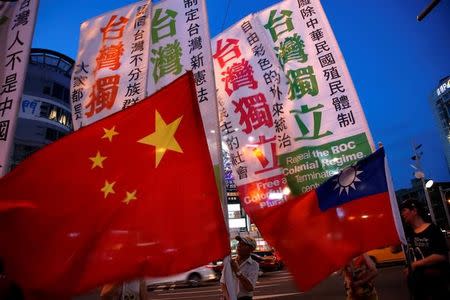China dismisses Taiwan 'dollar diplomacy' claims over Sao Tome

BEIJING (Reuters) - China on Thursday dismissed accusations from Taiwan that it engaged in "dollar diplomacy" to get Sao Tome and Principe to ditch ties with the self-ruled island, saying a petty Taiwan was besmirching China's good name. The tiny West African state's decision this week has angered Taiwan, which says the move will not help already strained relations with China. Taiwan says China took advantage of Sao Tome's financial woes to push its "one China" principle, that states Taiwan is part of China, ineligible for diplomatic recognition, adding Taiwan would not exchange cash for diplomatic favours. Chinese Foreign Ministry spokeswoman Hua Chunying said on Thursday the "one China" principle was a common consensus of the international community, and that China welcomed Sao Tome back on to the correct track of recognising this. "How can the 'one China' principle be traded for money? The Chinese government has never traded away its principles," she told a daily news briefing. "As for what certain people say in Taiwan, I can only say don't gauge the heart of a gentleman with your own mean measure." Despite Sao Tome's announcement, China has yet to formally say if it has now established formal diplomatic relations with the former Portuguese colony, and Hua said she had no further information on that. She did however confirm that China had established a liaison office in Sao Tome in November 2013 for trade and cultural exchanges, and that trade between the two was worth just $8 million in 2015. Sao Tome and Principe's tiny island economy is heavily dependent on cocoa exports but its position in the middle of the oil-rich Gulf of Guinea has raised interest in its potential as a possible oil and gas producer. China and Taiwan have over the years tried to poach each other's allies, often dangling generous aid packages in front of developing nations. China is deeply suspicious of Taiwan President Tsai Ing-wen, who it thinks wants to push for the island's formal independence, though she says she wants to maintain peace with China. China's claim to Taiwan has shot back into the spotlight since U.S. President-elect Donald Trump broke diplomatic protocol and spoke with Tsai this month, angering Beijing. Trump has also questioned the "one China" policy which the United States has followed since establishing relations with Beijing in 1979, under which the United States acknowledges the Chinese position that Taiwan is part of China. (Reporting by Ben Blanchard; Editing by Nick Macfie)

